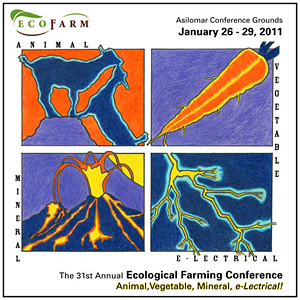 The price of Pixie tangerines. Contamination dangers for organic dairies from GMO alfalfa. The safety of tractor tweeting. Veterans transitioning into farming, pastoralism and grassland management, the cave paintings of Lascaux and sustainable meat production, the future of CSAs, hot heritage breeds and much, much more.
The price of Pixie tangerines. Contamination dangers for organic dairies from GMO alfalfa. The safety of tractor tweeting. Veterans transitioning into farming, pastoralism and grassland management, the cave paintings of Lascaux and sustainable meat production, the future of CSAs, hot heritage breeds and much, much more.
Such were just a fraction of the topics buzzing through the first day of the 31st annual EcoFarm Conference. It's Davos for organic farmers, where hundreds of forward-thinking, change-making ranchers, farmers, wholesalers, seed-company founders, and advocates for sustainable agriculture and food justice converge for 3 days of workshops, presentations, meals, and talk--lots and lots of talk, spilling over through panel discussions, cheese tastings, workshops, lunch lines, morning yoga and evening movies.
There's so much to discuss, after all, here at the forefront of the sustainable-ag revolution, where muddy boots and sun-creased foreheads tell the stories of decades spent cajoling balky tractors, hauling irrigation pipe, praying for rain or praying for sun, battling aphids in the Brussels sprouts and codling moth in the apples, and not least of all, convincing skeptical customers to try a purple carrot or a white beet.
And for once, Mother Nature has given her servants a gift: unheard-of sunny skies and summery, beach-basking temperatures, instead of the EcoFarm tradition of fierce winds, blustery rain, and January gloom. For once, the farmers who trekked in from the snowy reaches of northern Vermont or upstate New York are getting a real California vacation.
On Wednesday night, capping a day of "Farms with Barns" pre-conference events about sustainable animal husbandry, Nicolette Hahn Niman, author of Righteous Porkchop, advocated fiercely for a return to pre-CAFO systems of ranching. Armed with then-and-now photos and armfuls of statistics, she made a passionate case for the environmental benefits of raising (and eating) animals fed exclusively on pasture, the way she and her husband, Bill Niman (founder of Niman Ranch, although he's no longer associated with the brand), do in the green and pleasant land of West Marin.